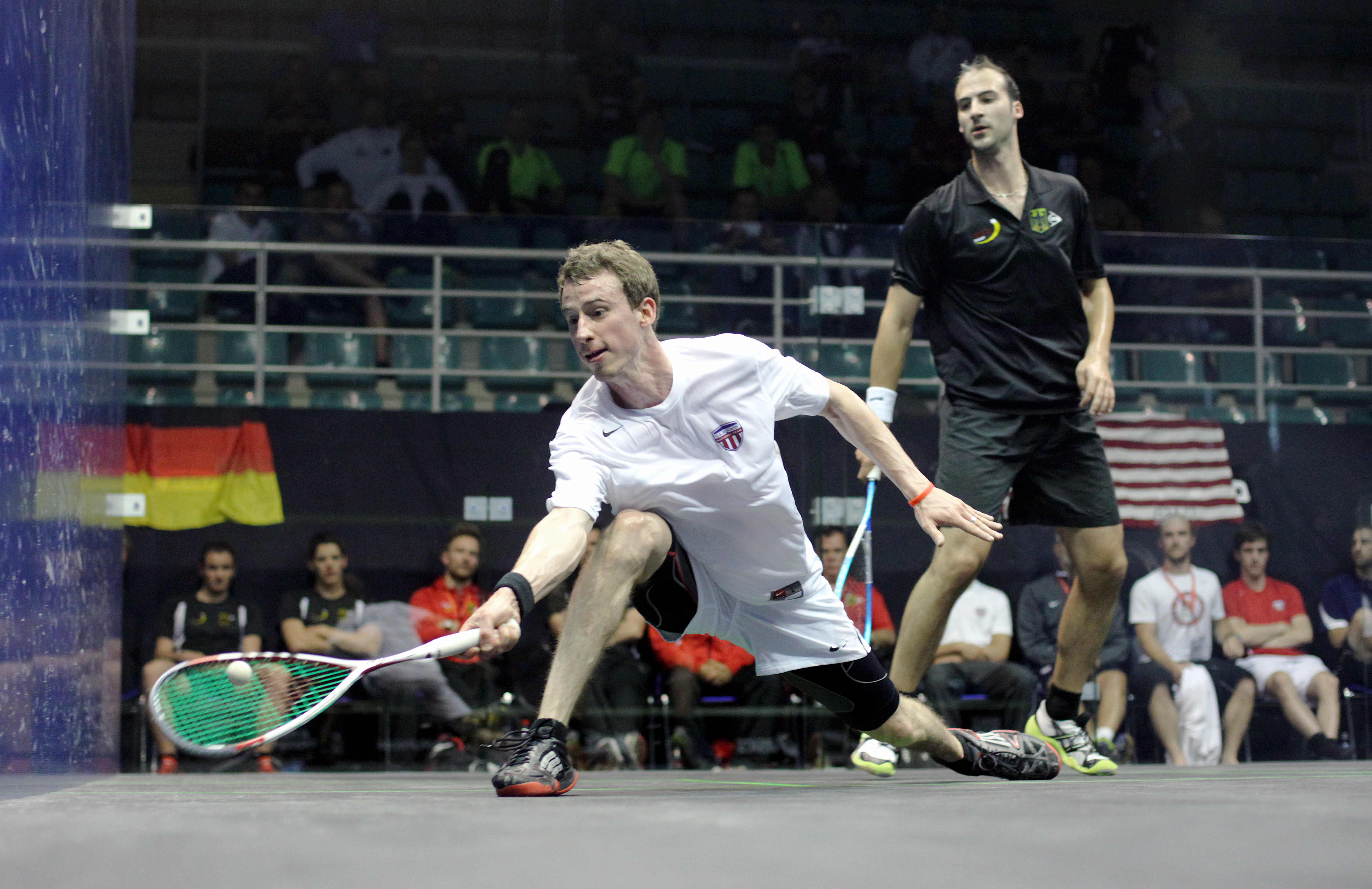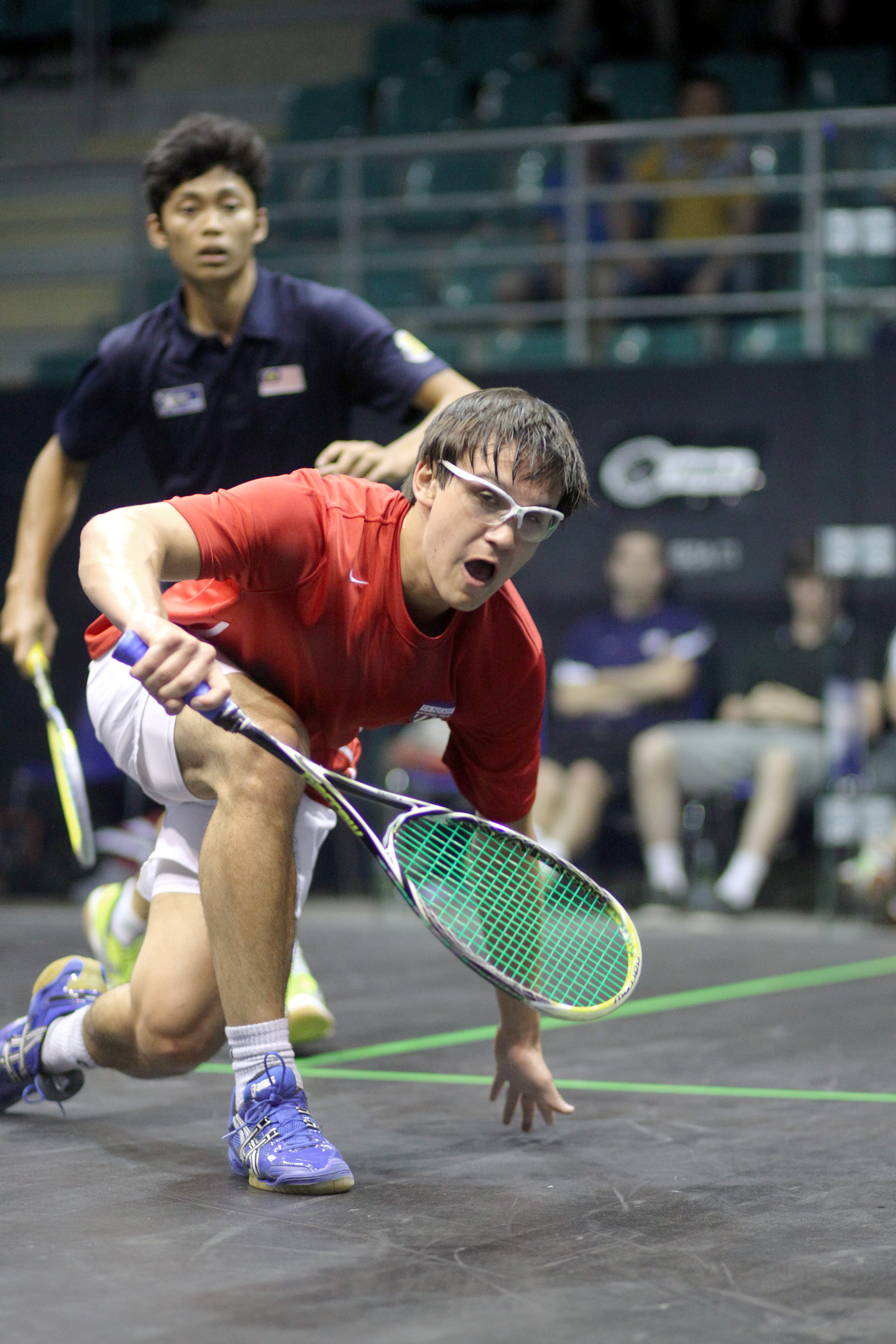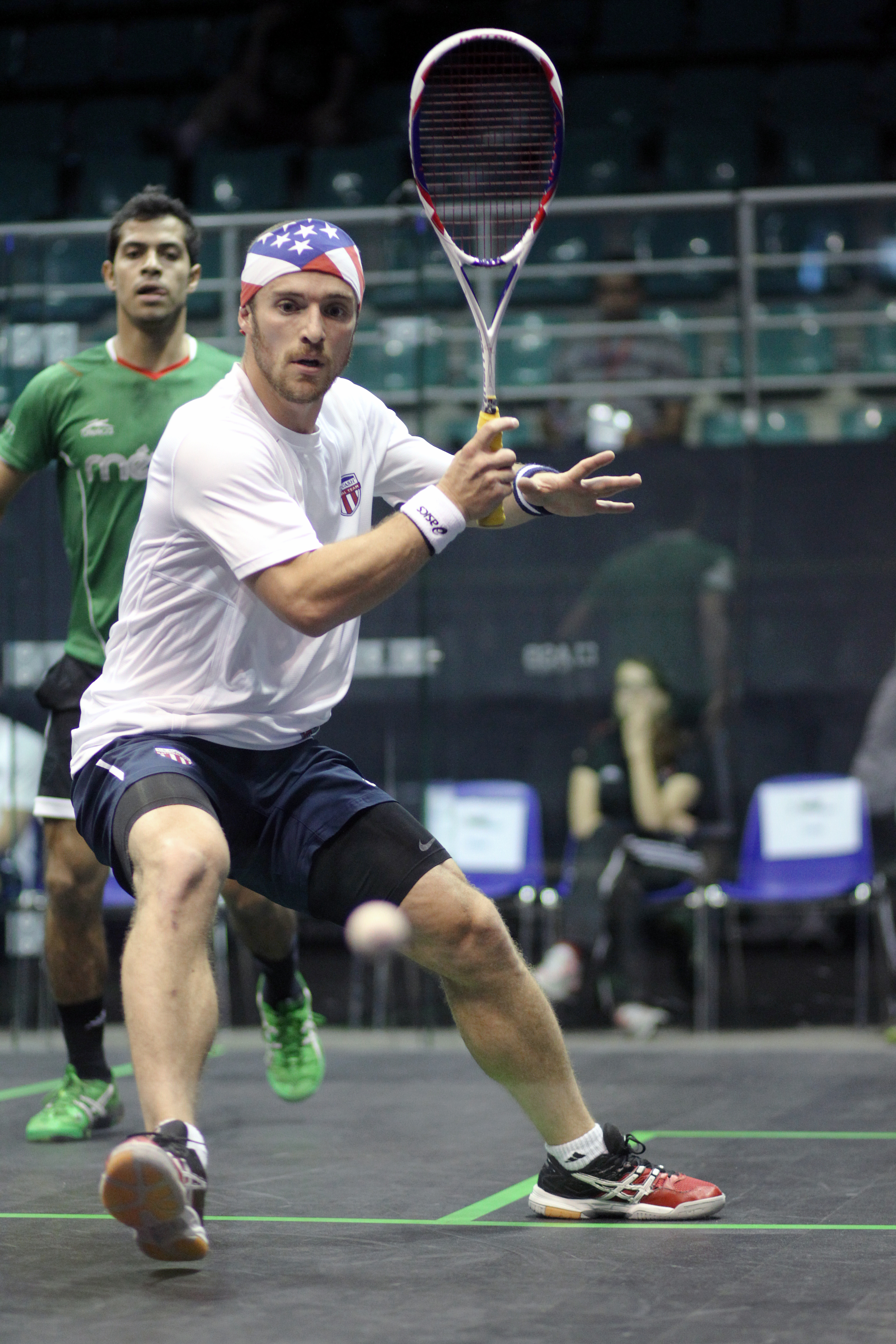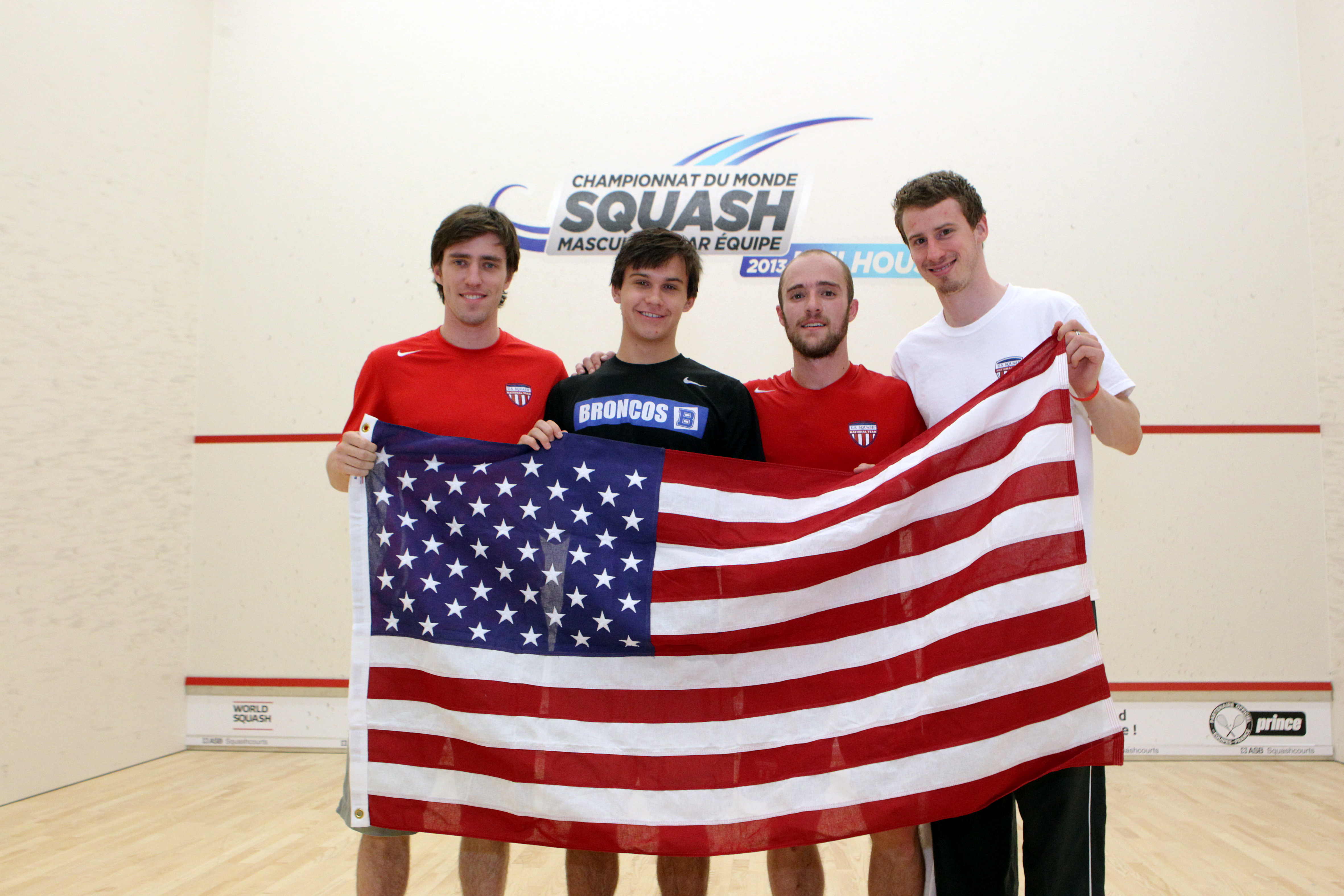
By Kristi Maroc
Photos by Steve Line/squashpics.com
As fans across the globe crowded around screens to watch the top players from 31 countries compete on three sideby- side glass courts that were simultaneously streamed live around the world, capacity crowds gathered in Mulhouse, France, to cheer from the sidelines at the highest level team event in the world, the 2013 Men’s World Team Squash Championship.
All matches were broadcast live online, allowing viewers to watch more than one match at once, and providing a venue and broadcast set up that was commended by many and highlighted squash’s progression in technology and innovation.
Gilly Lane, US National Team member, said the best part was the atmosphere. “It was almost like being at Wimbledon, knowing that other matches were right there and hearing the roars of the crowd from different matches as fans got up for their team to be supportive,” he said. “It created a great overall atmosphere in the arena.”

“Having it streamed on the web enabled viewers from all over the world to watch us live. Being able to have our families support us in real time from back home was pretty special,” he added.
England’s James Willstrop, World No. 3, was equally impressed with the broadcast and venue display.
“The set up here is almost revolutionary— I’ve never seen anything like it before, with three glass courts side-by-side,” he said.
“It’s squash moving forward, proving that it can do things in different ways— something other sports can’t do.”
For the US team, the championship was a bitter sweet mix of successes and misfortunes, which culminated in a notable twelfth place finish.
Following the announcement that the team from the 2011 Men’s World Team Squash Championship would be reunited once again for this year’s tour, college star Todd Harrity suffered a hamstring injury that sidelined him one week out from departure, forcing the team to reshuffle and add junior star Dylan Murray, the current Junior National Champion, in his place. The resulting team would be Chris Gordon, Julian Illingworth, Gilly Lane and Dylan Murray.
As disappointing as it was to lose the incredibly talented Harrity, the result was not catastrophic—with his replacement, 18 year old Murray, an impressively skilled junior who would later step up and prove his worth in the big guys league as the team battled through the event.
“We were all so excited to see Dylan play his first match on the men’s world stage, and he did not disappoint,” said Head National Coach, Paul Assaiante, following Murray’s first match against the Czech Republic, adding how pleased he was with the ensuing team.
“The men are in great spirits and getting along wonderfully!” said Assaiante.
“Gilly is always the energizer bunny, Julian with his delightfully dry sense of humor, Chris the squash mayor of any city in the world and Dylan the rookie who is starry eyed and a joy to be around.”
Unfortunately another disappointment came after the second round as Julian Illingworth succumbed to a hamstring injury mid-match against Germany, forcing him to retire after the third game and pull out of competing for the rest of the event.
That second count of bad luck left the three remaining players—Gordon, Lane and Murray—with full responsibility for the team’s future in the tournament.
“It was definitely kind of a downer in terms of the fact that we had an opportunity to better our placement from the championships before—but at the same time I think everyone kind of took it on their back to step up and step into the situation as it presented itself,” said Lane.
Murray said the team remained driven despite the setback.

“Thankfully when Julian got hurt, because of his great attitude, everyone remained positive,” he said.
“I could tell the team was bummed about the injuries to Todd and Julian but they were incredibly supportive on and off the court.”
The disappointment of losing both Harrity and Illingworth was leveled out by the remarkable performances of the enduring team, who all stepped up with their game faces on and delivered some incredible squash for the rest of the event.
Twenty-seven-year-old Gilly Lane returned from retirement in top form, tackling the six matches he ended up playing with gusto and style.
“Gilly is amazing. He is playing far better today than he was two years ago when he was playing much more full time,” said Assaiante.
Twenty-six-year-old Chris Gordon continued to show the world how he has become one of America’s finest players as he took on some of the biggest names in the squash world with the confidence
and skill of the very best in the sport.
“Chris was awesome at number one,” said Lane. “He put in everyday. I’m sure he was
tired, but he never showed it during the entire week.
“He stepped in and played the best players in the world. He’s had the best year of his career and he’s showing why.”
Assaiante echoed Lane’s thoughts. “Chris Gordon is no flash in a pan and can truly give the top boys all they can handle. As a rule he beats people he should beat,” he said.
Even youngster Dylan Murray, who was thrown into the most major event of his career to date, conducted himself in a relaxed and comfortable manner.
“Dylan was amazing. If he was nervous you couldn’t tell, and he took the challenge head on,” said Lane.
“He obviously had some tough matches but he stepped up and played to the best of his ability, and that’s all you can ask for.”
Murray said he was shocked when he received the call up to play on the National Team, and that the opportunity was inspiring.
“It was an unbelievable experience playing on the same stage as the most elite players in the world,” said Murray.
“I did the best I could but it was definitely a learning experience for me and showed me the steps I need to take to be able to compete at that level.”
By the last round, an eleventh place play off against Canada, fatigue didn’t stop Lane from taking his match against David Letourneau to a close five games, however he narrowly missed out at 9-11 in the last game.
It was his only loss of the entire event, out of an impressive six matches. Gordon stepped onto the court to take on Shaun Delierre, world ranked just a couple of places higher than him, however a combination of exhaustion and many let balls led to a somewhat contentious match
which resulted in a Canadian victory.
The overall outcome was an exhausted US team that nobody could deny gave it their absolute all, and who the United States should be incredibly proud of.

“I thought we were actually pretty successful given the circumstances with Julian being injured on the second day and the big match against Germany,” says Lane.
“To finish twelfth, with myself having to push up and play two, and playing every match, and with Dylan, a junior player playing in the men’s championships, I thought it was pretty successful for us to beat Mexico, and to get into that 9-12 bracket start. It was a great experience.”
“Playing for the US is always at the top of my list. Wearing the red white and blue is always a high point for me and I think it should be for any athlete.”
Coach Assaiante said that in addition to the talent of the men’s team that traveled to France for the Men’s World Team Championships, the United States has a solid future in national representation.
“Back home we have Todd Harrity and Chris Hanson, both who have just turned pro.
“We also have Graham Basset, Faraz Khan and David Ramsden-Wood in the queue, and a very exciting group of juniors,” he added.
“So the men’s squash team seems to be healthy for some time to come.
“I feel that this team did as well as it could after losing the service of Julian on day one.
“Every team is strong and rest is such a critical part of negotiating the event. One must find ways to give people a chance for recovery so that strategically you have a chance in the next round.
“I could not be more proud of our guys,” he said.





